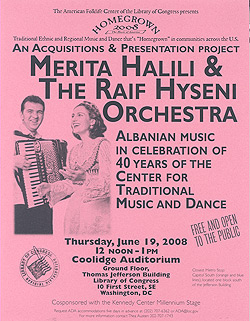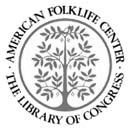| |
|||
|
The American Folklife Center at the Library of Congress presentsThe Homegrown 2008 Concert Series
|

|
About Albanian Music
Situated on the coastal plain in the middle of the country, the region of Shqipëria e Mesme was a center of cultural activities during the Ottoman period and gained further importance when Tiranë became the capital in 1920. Until World War II, singing by community members at urban weddings and other large family celebrations was augmented by songs and instrumental music performed by ensembles of professional male entertainers called ahengxhinj, who might be of Albanian or Rom (Gypsy) ethnicity. A typical ensemble or aheng consisted of violin, clarinet, llautë (a fretted, short-necked lute) or saz (fretted long-necked lute), and dajre (large frame drum). Often a group of four or five women, called çengi, would accompany the men's ensemble to an event, where they would sing to dajre accompaniment and perhaps also dance for the guests.
It is among the ahengxhinj and çengi that the most celebrated repertoire of Central Albanian towns developed, in a style that represents a local elaboration of Ottoman compositional techniques. Most songs, whether delicate love lyrics or spirited historical narratives, feature an alternation of vocal melody with instrumental interludes. Frequently they are in additive meters such as 9/8 or 7/4, and may be divided into several distinct sections, including ones in free meter. Their expansive melodies, which extend up to two octaves in range, include cascades of intricate ornamentation, as well as scales and chromaticisms that are characteristic of the Ottoman system of melodic modes or makam-s. After World War II, the accordion was introduced to the accompanying ensemble and quickly replaced the plucked strings. More recently, instruments such as saxophone, electric guitar and bass, synthesizer, and drum set have been used to give this repertoire a more contemporary feel.
—From notes by Jane C. Sugarman
About Merita Halili
Merita Halili is one of Albania's top performers. Born in the capital city of Tiranë, Merita grew up singing the lyric songs of her native region of Central Albania. Her nationwide debut came in 1983, at the age of 17, when she sang at the National Folk Festival in the town of Gjirokastër. Soon afterwards she began to perform on Albanian Radio and Television and as a soloist with the State Ensemble for Folk Songs and Dances. She subsequently became one of the most popular singers in the country. Merita was among the first singers in Albania to release her own recording, which still sells briskly wherever Albanians live. Perhaps her greatest recognition came in 1995, when she was awarded first prize at a gala festival held in Tiranë in which 90 singers from throughout the Albanian Diaspora participated.
The repertoire for which Merita is best known is that of the towns of Central Albania (Shqipëria e Mesme), particularly Tiranë, Elbasan, Kavajë, and Durrës. As she was growing up, Merita modeled her singing not only on family music making but also on recordings of older singers. These included both taped performances housed in the Institute of Folklore in Tiranë, and performances broadcast on Albanian radio by two famous woman singers of the previous generation, Hafsa Zyberi from Tiranë and Fitnete Rexha from Krujë, the latter of whom also coached her personally. In collaboration with musicians and arrangers at Albanian Radio and Television, she then developed her own approach to these songs, which includes more elaborate instrumental arrangements and full use of her prodigious range and vocal technique. More recently, Merita has recorded several newly composed songs, as well as a few popular Turkish and Rom songs. Some of her best-known performances were featured in the soundtrack for the acclaimed Italian film Lamerica. Raif Hyseni, Merita's husband and principal accompanist, hails from The Republic of Kosova [also spelled Kosovo], which has a large Albanian majority. Raif grew up in the town of Mitrovicë in Kosova, where he studied accordion at music school and performed in amateur ensembles. Before moving to Tiranë in 1992, Raif was a well-known radio and television performer in Prishtinë, the capital of Kosova, where he was a member of the group "Besnikët." Through his recordings and media appearances, Raif has become known as a major innovator on the accordion, for which he has composed dozens of instrumental melodies.
Merita and Raif immigrated to the United States in 1995, and now make their home in New Jersey. They perform frequently around the country on numerous stages, festivals and at community weddings.
This concert of the Homegrown 2008 concert series is presented in celebration of the fortieth anniversary of the Center for Traditional Music and Dance.
— From notes provided by Center for Traditional Music and Dance
 The American Folklife Center was created by Congress in 1976 and placed at the Library of Congress to "preserve and present American Folklife" through programs of research, documentation, archival preservation, reference service, live performance, exhibition, public programs, and training. The Center includes the American Folklife Center Archive of folk culture, which was established in 1928 and is now one of the largest collections of ethnographic material from the United States and around the world. Please visit our web site.
The American Folklife Center was created by Congress in 1976 and placed at the Library of Congress to "preserve and present American Folklife" through programs of research, documentation, archival preservation, reference service, live performance, exhibition, public programs, and training. The Center includes the American Folklife Center Archive of folk culture, which was established in 1928 and is now one of the largest collections of ethnographic material from the United States and around the world. Please visit our web site.
| ||||
